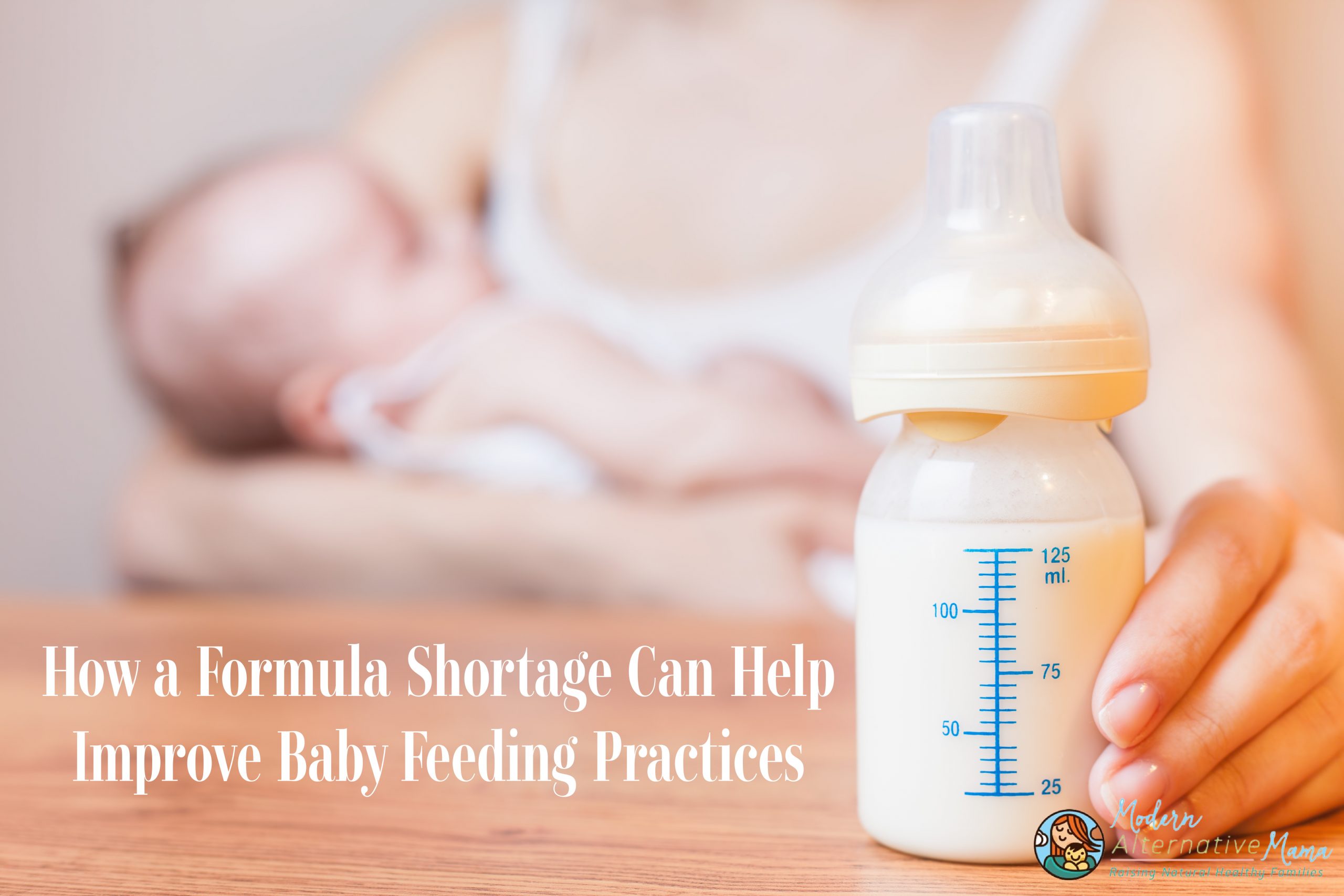It’s World Breastfeeding Week right now. How fun is that?!
If you’ve been around for awhile, you might know I’m a big supporter of breastfeeding. I’ve been breastfeeding one or more babies or toddlers continuously for more than 6.5 years now. My kids weaned between 2 and 4.5 years old. At one point, for one year, I tri-tandem nursed. That’s three kids all at once! (Not literally at the same time — that’s impossible.)
Right now I’m “only” breastfeeding one, my 17-month-old toddler. He’s showing no signs at all of slowing down, either!
Promoting breastfeeding is important to me. But, not more important than empowering moms to make the right choices for themselves, and respecting the choice those moms make. I think that we can advocate for breastfeeding without judging moms who don’t or can’t for whatever reason. And I think it’s really, really important to do that.
That’s why, today, I’m sharing 10 ways that we can really increase breastfeeding rates. Trying to “make” moms do it (I’ve heard a few people say that it should be the law that women have to at least try, which is way out of line), throwing around facts and data in a forceful way, or shaming moms who don’t breastfeed is not going to increase breastfeeding rates. But we can help, for real.
1. Share Information Honestly and Non-Judgmentally
Breastfeeding is such a touchy subject (well — “how you feed your baby,” breast vs. formula) that it sometimes seems like we can’t share breastfeeding information anymore. We must be able to share accurate, honest information about breastfeeding in a non-judgmental manner. And on that ‘honest’ part? Be honest about the struggles moms might face, too.
For example:
- Breastfeeding is the biologically normal way to feed an infant, and inarguably provides the best nutrition
- Breastfeeding provides immune factors, probiotics, human growth factors, and other components that are perfect for babies and which can’t be replicated
- The first 3 – 5 days of breastfeeding, when the baby is getting mostly colostrum, are the most important
- Breastfeeding on demand helps to build mom’s supply properly; feedings should not be scheduled in the early weeks (unless you have a sleepy preemie)
- Breastfeeding does not come “naturally” to most new moms; they and their babies need to learn how
- Breastfeeding may be painful at first until baby learns to latch on properly
- Continued pain with breastfeeding may be poor latch, tongue or lip tie, or another factor that requires a lactation consultant or doctor’s help
- Some women, often because of hormonal imbalances, honestly can’t produce enough milk, no matter how hard they try
These facts provide a much clearer picture of what breastfeeding looks like, both the positive and the negative. When we share only the positive, we make women who don’t or can’t breastfeed feel guilty. We even make women who desperately want to breastfeed and are struggling feel guilty — there is often a perception that breastfeeding is natural and should come easily, or that women who don’t produce enough milk just “aren’t trying hard enough.” These are damaging ideas (and I fell prey to the ‘breastfeeding is natural and easy’ myth with my first baby, and we struggled a lot for more than 6 weeks).
We have to be honest. Telling women “it shouldn’t hurt” or “you’ll figure it out” or “get in bed with that baby and nurse around the clock; your milk will come in” can be very, very damaging to our breastfeeding advocacy, because these things are not true for so many moms. We need to give caveats and gray areas, and we need to provide them support when things don’t go as planned. That’s part of it.
Check out:
- My Ideal Breastfeeding Diet
- What No One Tells You About Breastfeeding a Newborn
- Ecological Breastfeeding: A Natural Approach to Child Spacing
- Misconceptions About Extended and Tandem Nursing
2. Provide All Women with Breastfeeding Support Info Prenatally
The ideal time to provide breastfeeding information isn’t once the baby is born. It is while the mom is still pregnant!
All women should have access to breastfeeding information during their pregnancies. Local resources should be in the paperwork that all OBs and midwives hand out to their patients at their initial appointments, and they should follow up in the final weeks of pregnancy to make sure the woman still has these available. This sort of information should include:
- Name and contact information for local breastfeeding classes
- Names and contact information of local lactation consultants
- Types of breast pumps and how to get your insurance to cover them
- List of books on breastfeeding
- Location of any local LLL meetings or other breastfeeding support groups
- Samples of breastfeeding products, like pads, breastfeeding cream, etc.
- List of “things to expect” in the early days, and “when to call for help”
If you’re serious about advocacy, consider calling local OBs and midwives and asking them to add this type of information to their “welcome packets.” Or, if you have pregnant friends, offer this information to them yourself. If women know they are supported and know where to get the information they need and who to call for help, they are more likely to breastfeed.
3. Practice Mom- and Baby-Friendly Birth and Postpartum Policies
Ideally, all hospitals and birth centers would practice mom- and baby-friendly policies. Many still do not. Encourage new moms to write these types of policies into their birth plans and discuss them with their OBs or midwives before the time of birth. You may also write to local hospitals and encourage them to implement these. These include:
- Immediate skin-to-skin contact with baby after birth (unless an emergency arises)
- No interruption in contact/bonding for the first hour after birth
- Encourage immediate breastfeeding initiation (sometime within the first hour, when mom and baby are ready)
- Rooming in with baby so mom and baby have 24-hour contact (unless mom requests otherwise)
- Lactation consultants should be on staff and available 24 hours a day upon request
- No formula should be offered to baby, much less given without mom’s consent (but formula should be available if mom requests it or does not want to breastfeed)
- No formula gift bags should be sent home with mom (unless she has decided to formula feed already)
- Consider sending breastfeeding support bags home with mom (breastfeeding ointment, nipple pads, literature on breast pumps, etc.)
If possible, be an advocate for your friends or family members, or if you are a doula, your clients during the postpartum period. Ask the hospital staff to respect the family’s privacy. Help find a lactation consultant, cheer your friend on, stay with the baby if s/he has to leave the room to make sure that the parents’ wishes are respected. If your friend/family has a home birth, show up to clean the house, prepare meals, and allow the new mom to stay in bed and rest with her baby.
4. Provide Trained, Experienced Lactation Consultants to New Moms
All moms should have access to lactation consultants. Many insurance plans do cover these visits now. Find out ahead of time how to get visits covered and who to call, or help others in your area find that information. If insurance does not cover a lactation consultant visit, consider paying for one and gifting it to a new mom who is struggling.
A lactation consultant can help moms figure out if their babies are latching correctly, can possibly identify (but not formally diagnose or treat) a lip or tongue tie, can refer moms with bigger issues to appropriate professionals, and in general, increase breastfeeding success rates.
5. Gift New Moms Breastfeeding Support Items
If there’s a new mom in your life, give her the gift of breastfeeding support. Consider bringing her a gift basket with the following items:
- Nipple cream
- A list of good places to buy nursing bras (or even gift card for a nursing bra if you want — they’re not cheap!)
- Extra bottles or pump parts, if she’s using one
- Gel cooling packs
- A quality water bottle (nursing moms get thirsty!)
- Non-perishable snacks (they also get really hungry!)
- A nursing pillow
- A nursing cover
- Gift cards for her favorite take-out restaurant
- A promise to come and clean her house or do her laundry in the next week or two
Some of the items directly support breastfeeding; some support any mom who is postpartum. Offer to watch her older kids, if any. Bring her meals. Do anything you can to allow her to rest and care for her new baby and not worry that her house is falling apart.
6. Be a Shoulder to Cry On
Breastfeeding can be hard. And postpartum is hard anyway because hormones are all over the place. Moms can vary between absolute awe at their new baby to feeling completely overwhelmed. This can change from minute to minute, especially for first-time moms.
Be a shoulder to cry on. Cheer her on and celebrate with her over little victories (like “I got a five-minute shower alone” or “He latched on without causing me pain today”). Just listen to her. Don’t offer advice unless she asks. Be the person she can turn to whenever she needs to talk without someone judging her.
7. Support Public Breastfeeding
This one is really important, so listen up.
Support public breastfeeding. All public breastfeeding. Not “if she’s using a cover” or “if it’s a semi-private location” or “if there are no men around to watch.” Not “if the baby’s under 6 months old.” No caveats here. Just support public breastfeeding!
Women who breastfeed will have to feed their babies when they are out and about. They can’t plan to be home for all feedings. They can’t pump (some women don’t respond to a pump or don’t choose to buy one). They shouldn’t have to buy formula unless they want to. Not all women can or want to use a cover (and some women feel more conspicuous when they do use one).
Don’t judge another mom’s situation. Don’t lay your personal preferences on her (i.e. you might prefer to use a cover; don’t expect all other moms to do so, too). Don’t compare breastfeeding to sex, or say that your personal discomfort is more important than a baby’s right to eat — turn your head away!
When we tell women they shouldn’t breastfeed in public, or they can only “if…” then we are telling them we don’t really support breastfeeding. Moms who are already struggling could be inclined to give up, especially if they find themselves in public often. So just be supportive. Stand up for yourself or your friend if anyone calls you or her out for breastfeeding in public. At the very least, don’t say something unsupportive.
8. Support Pumping and Working Moms
It’s not easy to be a mom who has to go back to work when the baby is still young, and pumping is necessary. Support a woman taking pumping breaks every 2 – 3 hours. Be someone she can talk to about the struggles of pumping. (It’s not easy — having to bring all the pump parts, pump multiple times a day, bag and label the milk, keep it cool all day, transport it home, wash the pump thoroughly, and start again the next day. Plus supply can dip because a pump isn’t as effective as a baby, or some babies will refuse to nurse in favor of the easier bottle.) It’s a hard road, but many women choose it. Just let her know you support her.
9. Support Any Length of Breastfeeding
Every mom stops breastfeeding at some point.
Some stop after just a few days. Some continue for years. Each mom and baby’s breastfeeding journey is unique, and they have their own reasons for going as long (or as short) as they did. Moms are judged for stopping too soon, and for going too long, and that’s just sad. Why?
Even if your personal journey has led you to go for a long time, don’t judge moms who stopped after a few weeks or months. They may have struggles you don’t know about. They may have hormonal imbalances that made milk production hard. Maybe their babies never could learn to latch for one reason or another. Maybe they had to go back to work and were unable to pump. But you don’t know.
If you chose to stop after a few months or a year, don’t judge moms who went to two or three (or more) years. You may have felt that it was time to stop when your baby could eat solids, or had teeth, or turned one, or…whatever. Don’t assume that all moms should go by the same rules, or that there’s something wrong with them breastfeeding for a long time.
You never know a mom’s story. Don’t lay your personal beliefs on other moms’ breastfeeding journeys.
10. Don’t Judge Moms Who Don’t Breastfeed
This one is probably hardest for those who believe strongly in breastfeeding, but it’s the most necessary. Don’t judge a mom who doesn’t breastfeed.
Some moms choose not to because they are going back to work and don’t want the hassle of pumping. Some are coming from families where breastfeeding basically doesn’t happen and may even be frowned upon. Some may be victims of sexual abuse. Some may be on medications that are necessary and that don’t work with breastfeeding. Some moms are uninformed about breastfeeding.
But…these moms might someday feel comfortable breastfeeding a future baby. I know moms personally who chose formula for their first baby and went on to breastfeed later babies. We can’t advocate for breastfeeding if we’re putting down how they’re formula-feeding their baby. They will feel defensive. They will feel angry. They will not trust us as a source of information.
Don’t judge them. If and when they have another baby, ask if they’re interested in new information. Ask if you can help. Ask them to tell you their story. But don’t judge them for choosing not to breastfeed (or worse, for wanting to and not being able). Maybe, possibly, some of these moms will be able to breastfeed a future baby. And maybe they never will. Their children will still grow up well, knowing they have a mom who loves them and who fed them as best she could. Breastfeeding is important, but it is not going to make or break a child’s life.
How do you think we can work to increase breastfeeding rates?
SaveSave








These are excellent ways to really support, encourage, and promote breastfeeding! Just yesterday, while out, we learned of a young man and his family. The mother is breastfeeding. I encouraged him to continue supporting and encouraging her. I also found out that the mother sometimes is concerned about her pumping output, so I gave him some general info on that. It feels so good when I have the opportunity to share breastfeeding information with others. I also love that Baby Boy is still going strong at 15 months! 🙂
Once again, Kate, thank you for your solid good sense and ability to give a balanced and fair shake to topics. Great post.
Kate, this is an excellent article. Myself and all my friends are pretty crunchy and definitely pro-breastfeeding. But I think you touched on very important topics, especially about choice and being judgmental. I breastfed my son for ten months, including 7 months of working full time and pumping 7 or 8 times a day. I had to stop because I have severe RA and badly needed to get onto medication to control the damage. I felt very judged by many of my good friends, and I wish they had read your post! With my next baby, I may only breastfeed 3 or 4 months. As important as I think it is, I also think its important for my kids to have a mama who can walk and carry them and do all those physical tasks. I certainly hope that with the next one I can express clearly to the people around me that I understand how much healthier breastfeeding is, and that my reason for not continuing doesn’t mean that I’m lazy or don’t love my child as much as they do. Thank you for speaking truth.
[…] Check out 10 Ways to Really Increase Breastfeeding Rates. […]